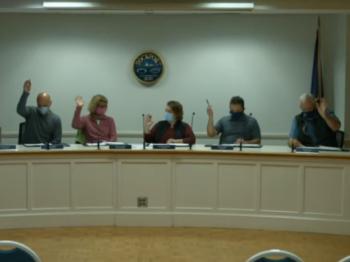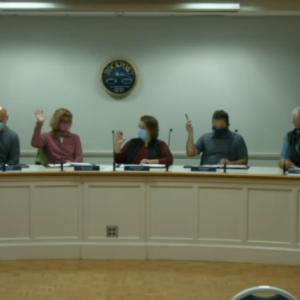Rockport moves forward with $64,000 Route 90 sewer study
On Nov. 1 members of the Rockport Select Board unanimously approved a proposed $64,600 engineering report for expanding the town’s sewer service along Route 90. The decision comes weeks after the board rescinded approval of a $40,000 study for the same project, citing concerns that this proposal, by a different engineering firm, would jeopardize the construction of a new sewer system receiving Economic Development Act (EDA) funding.
Acting as Wastewater Commissioners at the Monday night meeting, the Select Board’s decision to pursue a Route 90 sewer extension follows a decision by the Town of Camden to reject an interlocal wastewater agreement between the two municipalities:
“Given the decision of the Town of Camden to reject the Town of Rockport’s proposal for a new interlocal agreement which we feel is in keeping with the prior agreement and in agreements like it across our state, it is now time for the Board to ensure it is taking necessary steps to secure our future wastewater needs,” said Rockport Town Manager Jon Duke, in his manager’s report.
Route 90 sewer study
The $64,6000 proposal for a preliminary engineering report and to explore a new wastewater treatment plant in Rockport was prepared by Bangor-based Libra Solutions.
The price includes a $20,000 allowance to conduct ledge probes to determine the presence and depth of bedrock along the proposed Routes 90 pipeline route; the new sewer lines would run approximately from the Camden Hills Regional High School past the intersection of routes 17 and 90 and the West Rockport Fire Department.
“The preliminary engineering report will focus on the wastewater treatment and disposal needs of the Rockport Village area, Route 1 north of Pen Bay Hospital, and the proposed flows from a potential expansion of the sewer collection system along the Route 90 corridor between the Camden Hills Regional High School (the western terminus of the existing collection system) and the intersection with Route 17 where several potential development projects have been recently discussed,” writes Libra principal engineer and founder Joshua Saucier.
“We will work with Town staff to target Town-owned parcels available and suited for the construction of a new [wastewater treatment plant], considering proximity to the existing collection system, modifications necessary to the existing infrastructure to deliver wastewater to the property and carry effluent to the discharge location, and abutter concerns. We will also work with the Town to select the preferred treatment method(s) considering footprint, initial costs, operational costs, tankage, aesthetics, and other site suitability parameters. The site selection process will also include a preliminary assessment of project impacts on environmentally sensitive areas, historical and/or archaeological resources, and endangered species presence and habitat.”
Libra’s proposal states that upon signature from the Select Board, the study will be performed and results delivered to the town within four months. The cost does nut provide an allowance for gathering topographical data; this will be obtained using the Town’s geographic information system (GIS) technology and Google Earth.
Select Board chair Michelle Hannan said in recent years Rockport residents were paying the highest rates in the state for wastewater treatment services; Rockport has sent its wastewater to Camden and Rockland for treatment under interlocal agreement contracts.
“We want to grow. We want to grow our user rate. And I know that Camden has had challenges with their [wastewater] system and have even told us that they can’t take more, so I think unfortunately I think it has come time, and we know it’s expensive but we know there are grants which is an important piece, so I don’t want people to think that we’re not thinking of this thoughtfully. At the end of the day, we cannot have our resident’s have sewer bills that are higher than their taxes, and that’s what it is right now,” said Hannan.
Select Board member Mark Kelley said that he and fellow board members had reached out to officials in Rockland and Camden repeatedly over the years to improve wastewater service or to discuss existing interlocal sewer service agreements, with little result.
“At least eight or so times we have been reaching out to our counterparts –different board members, the [town] manager – and they’ve said consistently ‘we don’t want to negotiate a new contract, we think what you’re paying is fair,’ and at one meeting they didn’t even bother showing up. It’s unbelievable,” said Kelley.
“The Town of Camden has the right to do as they wish, it’s their treatment plant. But the reality is, if we look around and according to the experts we’ve been working with, it’s very likely that using that high [treatment] rate we’ve been paying for our users, there’s a potential we could have a savings in building our own plant that we own and we manage and we operate...I think that’s the idea going into this – controlling our own destiny,” said Duke.
In September, Finance Director Meghan Brackett said the Town had contingency money in the Capital Improvement Plan that could be used to fund a sewer study, and that the study would be a document necessary to receive EDA funding for the sewer project itself. An application to receive EDA funding would need to be filed by March of 2022.
“EDA funding is typically only 50 percent of the project, but because the [American Rescue Plan Act] funds that are available, they are awarding projects up to 80 percent. Talking with [Thomas,] we feel confident that we could qualify up to that 80 percent because of job creation, because of workforce housing and some other potential services we could put in,” said Brackett.





























